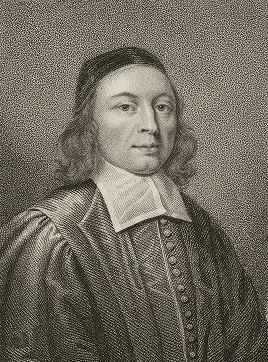
John Flavel
(1628-1665)
Born in 1628, John Flavel was the oldest son of Richard Flavel, a Puritan minister who died of the plague in 1665 while in prison for nonconformity. Educated by his father in the ways of religion, Flavel studied at University College, Oxford before entering the ministry. In 1650, he was ordained by the presbytery at Salisbury. He married Joan Randall, a godly woman, but both she and their first child died during labor. After a year of mourning, Flavel married Elizabeth Stapell and was again blessed with a close, God-fearing marriage, and eventually children.
In 1656, Flavel accepted a call to minister in the thriving seaport of Dartmouth. His work was quite spiritually profitable, and many were converted. Six years later Flavel was ejected from the pulpit, along with 120 ministers in Devon and nearly 1800 ministers across England, for nonconformity to the Church of England’s Act of Uniformity that legally ended Puritanism as a reform movement of the Church. The determined Flavel continued to meet secretly with his parishioners. Once he even disguised himself as a woman on horseback to reach a secret meeting place where he preached and administered baptism. Another time, when pursued by authorities, he plunged his horse into the sea and managed to escape arrest by swimming through a rocky area to reach Slapton Sands. Flavel also would preach secretly in the woods to larger numbers of people, sometimes as late as midnight. Once, soldiers rushed in and dispersed the congregation. Several of the fugitives were apprehended and fined, but the remainder brought Flavel to another wooded area where he continued his sermon.
In 1672, King Charles II issued the Declaration of Indulgence, giving nonconformists freedom to worship. Flavel returned to Dartmouth, licensed as a Congregationalist. When the indulgence was canceled the following year, he once more resorted to preaching secretly in private homes, secluded neighborhoods, or remote forests. Flavel’s second wife died during this time, and he married Ann Downe, a minister’s daughter. They were happily married for eleven years and had two sons.
In the late 1670s and early 1680s, Flavel carried on his ministry mainly by writing. He published at least nine books in this period. In the summer of 1682, he was forced to seek safety in London. During his stay there, Flavel’s third wife died. He married Dorothy, a widowed daughter of George Jefferies, minister of Kingsbridge.
In 1685, Flavel returned to Dartmouth, where his ministry was confined to his residence. He preached every Sunday and on many weekday evenings to people who crowded into his home. In 1687 Flavel was finally allowed to preach publicly once again. His congregation immediately built a large church upon his return to the pulpit.
Flavel’s last four years of public preaching, which began with his sermons on Revelation 3:20, “Behold I stand at the door and knock,” were greatly blessed. Yet he was aging rapidly. Speaking for himself and his colleagues, he wrote, “We have long borne the burden and heat of the day; we are veteran soldiers almost worn out.” While visiting Exeter to preach on June 6, 1691, Flavel suffered a massive stroke and died that same evening at the age of sixty-three. His final words were, “I know that it will be well with me.”
The repeated editions of Flavel’s Works bear their own witness to his popularity: five times were The Works of John Flavel issued in the 18th century and at least three times in the 19th. He was a favorite with Jonathan Edwards and George Whitefield (who ranked him with John Bunyan and Matthew Henry), and, a century later, with such Scottish evangelical leaders as R. M. M’Cheyne and Andrew Bonar.
John Flavel books include The Works of John Flavel, a six-volume set of the best of Puritan divinity; None But Jesus, a selection of some of the best of Flavel’s work; The Mystery of Providence, based upon Psalm 57:2 (“God that performeth all things for me”) and revealing how God’s providence is part of every experience in our lives; and Facing Grief, which offers guidance for Christian mourners.
[Edited from an article by Iain H. Murray in The Banner of Truth, No. 60 (Sept. 1968), also available at https://banneroftruth.org/us/resources/articles/2008/john-flavel/. See also Michael Boland’s ‘Introduction’ to Flavel’s The Mystery of Providence in the Trust’s Puritan Paperbacks series and the ‘Life’ in Volume 1 of his Works.]
